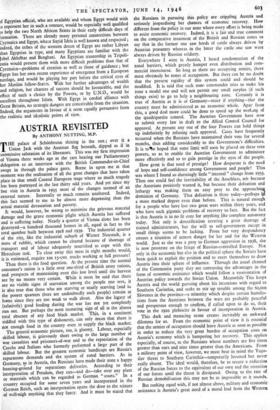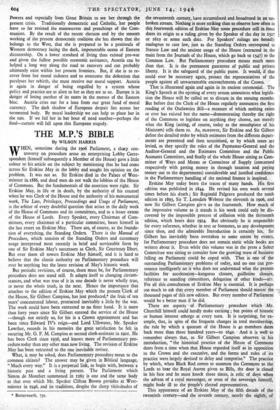AUSTRIA REVISITED
By ANTHONY NUTTING, M.P.
THE palace of Schonbrunn shining in the sun ; over it a Union Jack with,"the Austrian flag beneath, dipped as if in submissive salutation of its liberators. This was my first impression of Vienna three weeks ago as the cars bearing our Parliamentary delegation to an interview with the British Commander-in-Chief swept in through the palace gates. Borne in upon me at that moment was the realisation of all the great changes that have taken place in that small Central European stage where so much tragedy has been portrayed in the last thirty odd years. And yet since my last visit to Austria in 1935 most of the changes seemed of an external nature. Internally so much remains unaltered. Indeed, this fact seemed to me to be almost more depressing than the actual material devastation and poverty.
It would, however, be wrong to minimise the grievous material damage and the grave economic plight which Austria has suffered and is suffering today. Nearly a quarter of Vienna alone has been destroyed—a hundred thousand houses in all, equal in fact to the total number built between 1918 and 1939. The industrial quarter of the city, like the industrial suburb of Wiener Neustadt, is a mass of rubble,. which cannot be cleared because of shortage of transport and of labour adequately nourished to cope with this Hetculean task. To clear away this mess in eight months would, it is estimated, require too 15-cwt. trucks working at full pressure!
Then there is the food question. At the present time the normal consumer's ration is a little over one-third of British army rations, and prospects of maintaining even this low level until the harvest are -by no means very certain. While it must be said that there are no visible signs of starvation among the people one sees, it is also true that those who are starving or nearly starving (and iu the poorer quarters there are undoubtedly such people) remain at home since they are too weak to walk about. Also the legacy of (relatively) good feeding during the war has not yet completely run out. But perhaps the most menacing sign of all is the almost total absence of any food black market. This, in a continent riddled with this type of dishonesty, can only mean that there is not enough food in the country even to supply the black market.
The general economic picture, too, is gloomy. Labour, especially skilled labour, is grievously short owing to the large number of war casualties and prisoners-of-war and to the repatriation of the Czechs and Italians who formerly performed a large part of the skilled labour. But the greatest economic handicaps are Russia's reparations demands and the system of zonal barriers. As in Germany, so in Austria, the Russians have made their zone a happy hunting-ground for reparations deliveries. According to their interpretation of Potsdam, they can—and do—take over any plant or materials which can be regarded as German " assets." In a country occupied for some seven years and incorporated in the German Reich, such an interpretation opens the door to the seizure of wellqigh anything that they fancy. And it must be stated that the Russians in pursuing this policy are crippling Austria and seriously . jeopardising her chances of economic recovery. How different from the policy in our zone where every effort is being made to assist economic recovery. Indeed, it is a fair and true comment on the comparative treatment of the British and Russian zones to say that in . the former one saw herds of cattle always driven by Austrian peasantry whereas in the latter the cattle one saw were always driven by Russian soldiery.
Everywhere I went in Austria, I heard condemnation of the zonal barriers, which greatly hamper even distribution and com- mercial intercourse. So long as there are occupying armies, there must obviously be zones of occupation. But there can be no doubt that the present rigidity of this system could and should be modified. It is said that each zone commander tries to make his zone a model one and will not permit any small surplus (if such things exist) to go to help a neighbouring zone. Certainly it is true of Austria as it is of Germany—truer if anything—that the country must be administered as an economic whole. Apar from this, a good deal more could be done to speed up the worl.ing of the quadripartite control. The Austrian Government have now to submit every law in draft to the Allied Control Council for approval. At present any one of the four Powers can hold things up indefinitely by refusing such approval. Cases have frequently occurred when the Russians have maintained their veto for several months, thus adding considerably to the Government's difficulties. It is toe hoped that some limit will soon be placed on these veto powers, so as to enable the Austrian Government to administer more effectively and so to gain prestige in the eyes of the people.
How great is that need of prestige! How desperate is the need of hope and self-confidence among Government and people! This was where I found so alarmingly little " internal " change from 1935. Then one could feel the inevitability of the Anschluss, ndt because the Austrians positively wanted it, but because their defeatism and lethargy was making them an easy prey to the approaching dominion of Germany. That defeatism is there today—perhaps Iji a more marked degree even than before< This is natural enough for a people who have lost two great wars within thirty years, and who have such gigantic problems of recovery to face. But the fact is that Austria is in no fit state for anything,like complete autonomy today. Not only is denazification creating a great shortage of trained administrators, but the will to self-government except in 'small things seems to be lacking. From her very despondency ensues a situation of utmost danger for her and for the Western world. Just as she was a prey to German aggression in 1938, she is now prostrate on the fringe of Russian-controlled Europe. Not only in the economic but also in the political sphere the Soviets have been quick to exploit the position and to exert themselves to draw Austria into their sphere of influence. Through the usual channel of the Communist party they are canvassing the advantages in the form of economic assistance which would follow a reorientation of Austrian policy towards the Soviet Union. Meanwhile Tito keeps Austria and the world guessing about his intentions with regard to Southern Carinthia, and seeks to stir •up trouble among the 6o,000 Slovenes in the province—a minority which despite certain humilia- tions from the Austrians between the wars are probably peaceful and prosperous enough to confirm, if called upon to do so, their vote in the 192o plebiscite in favour of incorporation in Austria.
This dark and menacing scene creates inevitably an awkward dilemma for us. From the economic point of view it is essential that the armies of occupation should leave Austria as soon as possible in order to reduce the very great burden of occupation costs on Austria's economy which is hampering her recovery. This applies especially, of course, to the Russians whose numbers are five times greater than ours and nine times greater than the Americans. From a military point of view, however, we must bear in mind the Yugo- ilav threat to Southern Carinthia—temporarily lessened but never really absent. The ideal would, therefore, be to secure a reduction of the Russian forces to the equivalent of our own and the retention of our forces until the threat is dissipated. Owing to the rate of Russian demobilisation this may not be as impossible as it sounds. But ranking equal with, if not almost above, military and economic assistance is Austria's great need of a moral lead from the Western Powers and especially from Great Britain to. sec her through the present crisis. Traditionally democratic and Catholic, her people have so far resisted the manoeuvres and preachings of the Com- munists. By the result of the recent election and by the smooth working of the present democratic coalition she has shown that she belongs to the West, that she is prepared to be a peninsula of Western democracy facing the dark, impenetrable ocean of Eastern dictatorship. On a lower standard of living than existed pre-war and given the fullest possible economic assistance, Austria can be helped a long way along the road to recovery and can probably ultimately exist within her present frontiers. But, if she is to re- cover from her moral sickness and to overcome the defeatism that paralyses her rebirth, she must receive our moral support. Austria is again in danger of being engulfed by a system whose policy and practice are as alien to her as they are to us. Europe is in danger of losing another of its states in the morass of the Eastern bloc. Austria cries out for a loan from our great fund of moral currency. The dark shadow of European despair lies across her tormented body. By moral leadership we can help to place her in the sun. If we fail her in her hour of need another—perhaps the final—curtain will fall upon this European tragedy.































 Previous page
Previous page